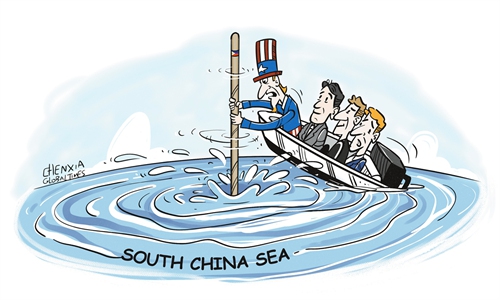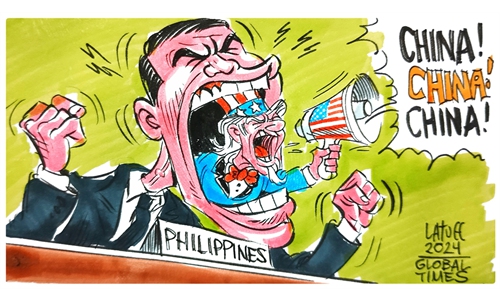
Illustration: Chen Xia/GT
According to a Monday report from Reuters, Philippine Defense Secretary Gilberto Teodoro said in an interview that China's "misbehavior" in the South China Sea has placed the Philippines at the forefront of regional security concerns. "Simply put, China has given the Philippines some prominence that in normal terms, if everybody followed the rules of the road, if they didn't do bad things, then this prominence of the Philippines would not be there," he said.
Indeed, the Philippines now has become prominent in the South China Sea, but definitely not in a positive light. Teodoro's comments, an attempt to cover the Philippines' misbehaviors, released several wrong messages. In fact, be it at Ren'ai Jiao (also known as Ren'ai Reef) or Xianbin Jiao (also known as Xianbin Reef), Manila is the first one to escalate the situation by provoking China, while China's responses are counteraction to the Philippines' provocations to defend its legitimate rights and interests in the region.
Teodoro's words misinterpret not only the nature of China's actions but also his country's so-called "prominence," which he presented as if it were a "medal of honor." This shows that some Philippine politicians are not ashamed but take pride in Manila's provocative behavior on the South China Sea issue.
Li Kaisheng, vice president of the Shanghai Institutes for International Studies, told the Global Times that Teodoro's remarks also reflect the Philippines' goal of elevating its own status in the international arena by taking advantage of the South China Sea issue. For some time now, it has tried to win global and regional sympathy through public opinion warfare and victim-playing game. However, such gimmicks have not produced the effects that Manila wanted.
The only "prominence" the Philippines has in the South China Sea issue is its image as a constant provocateur manipulated by the US. Li believes that Manila's behaviors in the South China Sea reflect that apart from succumbing to domestic misconceptions about China policy, it also fully serves Washington's geopolitical strategy of suppressing China.
By taking the initiative to proactively bind its policy to the US' anti-China chariot, the Philippines undermines its relations with China, peace in the South China Sea, as well as ASEAN's overall diplomacy of balancing among great powers, Li said.
In the near future, the US will continue to add fuel to the "fire" of turbulence in the South China Sea. For instance, after the recent third Maritime Dialogue in Manila between the two countries, the US Embassy in the Philippines announced in a statement on Monday that the US will provide $8 million in new funding for the modernization of the Philippine Coast Guard.
Besides, although the result of the upcoming US presidential elections has left many US allies, including the Philippines, concerned, some cooperation mechanisms are expected to be maintained between the two countries. This is the exact reason why Teodoro also claimed his country is confident in the US' security policy continuity in the Reuters article.
With the "double insurance" of its strategy and specific actions, the US successfully reassures the Philippines to "make a bigger wave" in the South China Sea.
Famous American artist Andy Warhol once said, "In the future, everyone will be world-famous for 15 minutes." Now, what the Philippines seems to be doing is to use its madness to achieve its own 15 minutes of fame. But as a cheap product of playing eye-catching tricks, such fleeting publicity will die out quickly.
The Philippines needs to understand that to truly resolve the South China Sea issue, it sooner or later has to return to rationality and sincere dialogues with China. Indulging in stirring troubles in the South China Sea just for the sake of obtaining "prominence" will only strengthen the world's negative impression of the Philippines.



